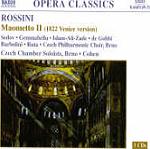This is the first recording of Rossini’s 1822 revision for Venice of his Maometto II, which had been premiered in the far more sophisticated city of Naples two years before. Venetian tastes required a happy ending and some of the composer’s famous crescendos, but Rossini made other alterations as well: he added a fine quartet in Act 1; lowered the vocal range of a somewhat minor character, Condulmeiro, from tenor to bass; eliminated Anna’s entrance aria and a second aria for Maometto; and re-wrote a trio in the second act. Those familiar with his operas will be pleased/annoyed/surprised to discover that instead of Anna committing suicide at the opera’s close, she sings “Tanti affetti”, the same aria with which La donna del lago closes! In whatever version (and that includes La siège de Corinth, for Paris), Maometto is a fascinating, dark-hued work, with arias and ensembles that flow seamlessly into one another and recitative that always is part of the musical texture.
Even given the different editions, this set has stiff competition. One on Philips has Sam Ramey, June Anderson, and Ernesto Palacio; a “private” label called Serenissima has Bruce Ford, Ramey, and Cecilia Gasdia at their best; and Ricordi stars Gasdia, Ramon Vargas, and Michele Pertusi. But forgetting about the others, what we have here is an otherwise un-recorded version at a bargain price, in a very respectable performance.
Brad Cohen leads a very well-drilled Brno chorus and orchestra and he understands Rossini. Particularly in a work this sophisticated, the build-up of disparate parts to create tension can be elusive, but Cohen gets the drama right. At the same time, he’s kind to his singers, some of whom are better than others. Bass Dennis Sedov, in the title role, is authoritative, fluent in his rapid scale work, and thoroughly involved. The voice is a bit rough, but he impresses. Luisa Islam-Ali-Zade sings Anna Erisso’s music–and there’s plenty of it–very well. Note that she’s a mezzo and the women singing the role on the other recordings are sopranos (Anderson and Gasdia). She’s more than capable of handling the tessitura, and her vocal weight adds emotional weight to the character as well–she’s a singer to watch.
As Calbo, a trouser part, mezzo Anna-Rita Gemmabella makes some nice dramatic sounds, particularly in her big, last-act scene (so brilliantly sung on other recordings by Horne and Verrett), and she finds a way around the daunting coloratura by slightly simplifying the vocal line without losing the effect. Her booming low-notes are designed to knock you flat, and they do: the audience erupts (this was taken from live performances in July, 2002 at Kurhaus Bad Wildbad). Tenor Massimiliano Barbolini is way outclassed by his competition–he has little facility with rapid passagework and he strains. Bass Antnio de Gobbi as Condulmiero is another voice worth keeping track of. The sound is quite good. There’s some confusion with regard to the track listings and the track-by-track synopsis, but you’ll figure it out, albeit without a libretto. In short, Rossini completists will have to have this, and it’s a nice addition to the catalog; but if you only want one Maometto II (Naples edition), either Philips or Serenissima is preferable.
































